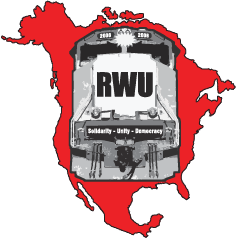Eugene V. Debs - Pioneer Rail Labor Leader
-
Eugene V. Debs - Pioneer Rail Labor Leader -
Eugene V. Debs
A Brief Biography
Eugene Victor Debs, by far the best known U.S. rail union leader, was born in Terre Haute, IN November 5, 1855. Born to French immigrant parents, Debs dropped out of school at age 14 and went to work on the railroad as a shop worker. Shortly thereafter he became a locomotive fireman. By age 20 he was made secretary of his new local lodge of the Fireman’s union. Then in 1880, he was named Grand Secretary of the Brotherhood of Locomotive Firemen (BLF) and editor of the Magazine.
In his capacity as a union leader, Debs worked tirelessly to organize the firemen, but soon came to realize that the other railroad crafts must also be organized in order for the firemen to have any real power. Thus, he then assisted in the organizing of the brakemen, switchmen, carmen and telegraphers among other crafts, into their respective craft unions. Appreciating the need for active cooperation between crafts and their unions, he set about to organize a federation of rail workers’ unions. Success was achieved in this endeavor as well, until craft jurisdiction and jealousy caused the federation’s collapse.
Not long after, Debs resigned his position as Secretary-Treasurer of the BLF despite the mass objection of the firemen rank and file. And in 1893, together with other forward thinking rail union leaders, Debs organized the nation’s first industrial union, the American Railway Union (ARU). After years of first hand experience with the failures of the old craft unionism, Debs was now firmly convinced of the need for this new advanced form of union – the industrial union – where all workers in the industry would be organized as a whole, as opposed to separated – and hence ineffectual – under the old outmoded craft union structure.
The American Railway Union generated wide interest and support among the rail workers of North America. Rails were signing up at the rate of 2,000 a week, and within six months the new organization had 150,000 members! Its first contest pitted it against the Great Northern, and its powerful President James J. Hill, the “Empire Builder”, in the spring of 1894. ARU members from all crafts struck and the Great Northern was paralyzed. In less than three weeks time, the union had emerged victorious, winning nearly all of its demands. The power of industrial unionism had been demonstrated!
A few months later the ARU faced another test as it was pitted against the Pullman Company. In what was to become known as the "Great Pullman Strike of 1894”, the ARU was defeated by a grand coalition of Pullman, the major rail carriers, the corporate press, and the federal government and troops. The carriers – and corporate America as a whole -- were determined to smash the ARU because it presented a formidable opponent, a valuable example of what can be achieved when workers organize along industrial lines. Meantime, the carriers continued to work “cooperatively” with the weak, divided and ineffective craft unions. Debs and the other ARU leaders were jailed for violating a federal judge’s injunction against the strike, which was later upheld by the Supreme Court.
Debs’ experience with the ARU and prison further radicalized him. Around the turn of the century, together with other labor and populist political leaders, he founded the Socialist Party of America. Debs went on to become a founding member of the Industrial Workers of the World (the IWW or “Wobblies”) in 1905, an industrial type union that advocated “One Big Union” of all workers of all lands. He also ran for President of the United States five times, once receiving nearly a million votes as a federal prisoner in the Atlanta Penitentiary.
On June 16 1918 , after nearly a half century of union and political organizing – now in his 60s -- Debs gave a speech in Canton, Ohio in opposition to World War I. He was arrested under the Espionage Act of 1917. He was convicted, sentenced to serve ten years in prison and disenfranchised for life. Once again, the Supreme Court upheld his conviction.
He was pardoned and released on Christmas Day, 1921 by President Harding at age 65. While his health was broken, his spirit and optimism remained indomitable. He remained an outspoken advocate for the cause of labor and the working class. Debs died in 1926 at the age of 70 in Elmhurst, Illinois.
Eugene V. Debs lived an extraordinary life, one devoted to the cause of the average working man and woman. He was a true hero of the railroad workers of his time and remains one to this day, his name revered by railroad workers from coast-to-coast
Railroad Workers United proudly presents this Page dedicated to the life and work of visionary rail labor organizer and leader, Eugene V. Debs.
Watch “1877: The Grand Army of Starvation.” Executive Director of the St. Paul, MN East Side Freedom Library and RWU Solidarity Member Peter Rachleff introduces this film. “1877: The Grand Army of Starvation” tells the story of our first nationwide general strike. At the depths of a prolonged depression, railroad workers responded to yet another wage cut by going on strike, blocking trains, and confronting federal troops who were sent to put down the strike. The film makes creative use of cartoon images, actors, and the reading of court testimonies to bring this important struggle to life. Narrated by James Earl Jones, directed by Stephen Briers.





